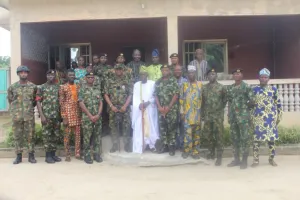The United States Nashville is travelling around the west coast of Africa, serving as a floating classroom, as part of an international effort to promote maritime safety and security in the region.
But if you think that what the ship is doing for the Africa Partnership Station initiative — as the collaborative effort is known — is only about naval exercises, you are wrong. There is a strong civilian-training component with participation by organizations such as the US Commerce Department’s National Oceanic and Atmospheric Administration and the Wildlife Conservation Society, a nonprofit whose mission might seem more tied to land.
How does the society fit into a maritime environment? In Gabon, for example, society members worked recently with that country’s navy and Department of Fisheries on ways to better protect marine life in the Mayumba National Park along the Gabon-Congo border.
Park staff learned about a radar installation that will help with future enforcement efforts in and around protected areas. Richard Parnell, who worked on the society’s project in Mayumba, said it will help park authorities plan future missions.
The Africa Partnership Station began in 2006 by sending US ships on rotating port visits throughout the region, carrying on-board partners from Europe, South America and Africa. In the summer of 2009, the Dutch navy will send one of its amphibious ships to promote meteorological and oceanographic projects in the Gulf of Guinea.
Central and Western African nations have requested assistance for all the training projects undertaken as part of the partnership, including how to cope with oil spills.
The Nashville, which made its latest port call in Lagos, Nigeria, has representatives onboard from 10 countries in and around the Gulf of Guinea, seven from Europe and one from South America. The crew manifest includes specialists in fishery management and environmental conservation.
The Americans and Nigerians are working on a hydrography project measurement of navigable waters as well as port security improvements. Italians are taking the lead in fishery enforcement workshops in Nigeria.
Many of the nations in the region are especially interested in halting the loss of revenue being siphoned off by illegal fisherman. But there are other problems, too, including the transit of narcotics and human trafficking.
The United States sees the initiative as a way to build enduring relationships in the region and provide fast disaster and humanitarian assistance when needed. The activities are designed so the participants learn from each other and build trust along the way. Similar endeavours are under way in other parts of the world.
Besides Nigeria and Gabon, the Nashville has sailed to Cameroon and Senegal. Although the ship did not make a full-fledged visit to Liberia, it dropped off some US Marines to work briefly with the military in Monrovia.
















Discussion about this post